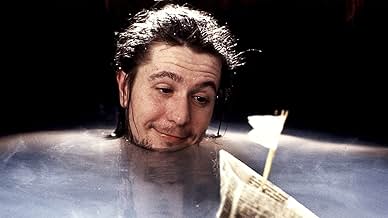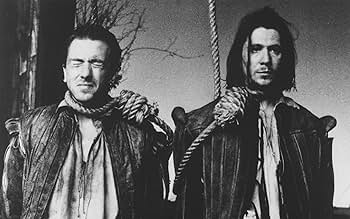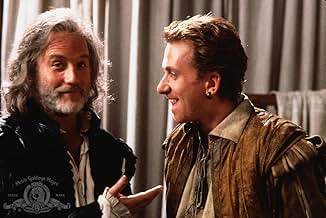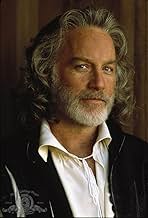Rosencrantz & Guildenstern sont morts
Titre original : Rosencrantz & Guildenstern Are Dead
- 1990
- Tous publics
- 1h 57min
Ajouter une intrigue dans votre langueTwo minor characters from the play 'Hamlet' stumble around unaware of their scripted lives and unable to deviate from them.Two minor characters from the play 'Hamlet' stumble around unaware of their scripted lives and unable to deviate from them.Two minor characters from the play 'Hamlet' stumble around unaware of their scripted lives and unable to deviate from them.
- Réalisation
- Scénario
- Casting principal
- Récompenses
- 3 victoires et 2 nominations au total
Serge Soric
- Tragedian
- (as Srdjan Soric)
Sven Medvesek
- Laertes
- (as Sven Medvesck)
Avis à la une
This clever screenplay by Tom Stoppard challenges the viewer to listen and watch closely as the Shakespeare tragedy Hamlet is turned on its ear via taking the perspective of the oblivious rhetorics, Rosencrantz and Guildenstern. There are multiple 'plot within plot' twists which intersect and skew at will, sometimes creating a surreal experience for the observer. The script is brilliant, full of double-entendres and mixed reactions executed superbly by Tim Roth and Gary Oldman, along with a solid supporting cast (including American actor Richard Dreyfus). Stoppard felt that the title characters, messengers in the original play, were under represented and so examines their possible perspectives in the tale by way of exploring their destiny and their lack-of-awareness of it. Stunning and hilarious wordplay with excellent repartee between Oldman and Roth. Refreshing and creative spin of the tale of Denmark's 'melancholy prince'.
This film is one of the most glorious and intriguing examples of modern cinematic art I have ever encountered. I am not going to run you through the entire movie, as that has been done several times on here already, but I would like to clear up a few misunderstandings and harsh words that I have read in previous comments.
First and foremost, I have not seen or read the play (although I am looking forward to it) and I was perfectly able to understand all of the so-called "high-brow" concepts like fate, time, freewill, self-awareness, and the light peppering of existential musings (my favorite of which is the "...well at least I'm not dead." speech). The first time I watched this film I was very fascinated, amused, and slightly confused. These Pythoneon nonsensical scenes that some of you are reffering to were a bit difficult to understand, but after a second viewing they all made perfect sense. It does not take a genius to see the multiple layers and metaphors being used in this film. As for being totally lost without first seeing the play, that is rediculous. It took a bit of thinking and rewinding, but it is comprehensible, and after you figure it all out for yourself it is very rewarding and adds to the enjoyment, and genius, of the film. For example, the first time i watched this movie I was very confused by the pages of manuscript randomly floating around after R&G encounter the players for the first time. But once you realize that the lead player is fully self-aware, has been through these scenarios (the play "Hamlet") several times with a full consciousness and memory of the events (demonstrated rather obviously by his full knowledge of future events, the play that his troupe rehearses in front of R&G wich is an exact copy of "Hamlet", etc.) it makes for a wonderful metaphor demonstrating what has happened to the original play (Hamlet) now that some of its more flat characters are starting to think outside the script, so to speak, and become a bit more round.
Well, I could go on forever about this masterpiece, and maybe I will at a later date, but for now I just wanted you know that this film is anything but simple. If you can manage to put a little thought into what you are seeing and hearing you will find that it is perhaps the most complex, multi-layered, intuitively rewarding film ever created.
P.S. I am afraid this film is not widely accessible to the majority of movie watchers, which really saddens me because it is truly an amazing work of art. I would very much like to remedy this. So, if you have watched this movie at least 2 times, and are still puzzled by some of the scenes, please feel free to email me and I would be happy to explain anything that might heighten your understanding of the film.
First and foremost, I have not seen or read the play (although I am looking forward to it) and I was perfectly able to understand all of the so-called "high-brow" concepts like fate, time, freewill, self-awareness, and the light peppering of existential musings (my favorite of which is the "...well at least I'm not dead." speech). The first time I watched this film I was very fascinated, amused, and slightly confused. These Pythoneon nonsensical scenes that some of you are reffering to were a bit difficult to understand, but after a second viewing they all made perfect sense. It does not take a genius to see the multiple layers and metaphors being used in this film. As for being totally lost without first seeing the play, that is rediculous. It took a bit of thinking and rewinding, but it is comprehensible, and after you figure it all out for yourself it is very rewarding and adds to the enjoyment, and genius, of the film. For example, the first time i watched this movie I was very confused by the pages of manuscript randomly floating around after R&G encounter the players for the first time. But once you realize that the lead player is fully self-aware, has been through these scenarios (the play "Hamlet") several times with a full consciousness and memory of the events (demonstrated rather obviously by his full knowledge of future events, the play that his troupe rehearses in front of R&G wich is an exact copy of "Hamlet", etc.) it makes for a wonderful metaphor demonstrating what has happened to the original play (Hamlet) now that some of its more flat characters are starting to think outside the script, so to speak, and become a bit more round.
Well, I could go on forever about this masterpiece, and maybe I will at a later date, but for now I just wanted you know that this film is anything but simple. If you can manage to put a little thought into what you are seeing and hearing you will find that it is perhaps the most complex, multi-layered, intuitively rewarding film ever created.
P.S. I am afraid this film is not widely accessible to the majority of movie watchers, which really saddens me because it is truly an amazing work of art. I would very much like to remedy this. So, if you have watched this movie at least 2 times, and are still puzzled by some of the scenes, please feel free to email me and I would be happy to explain anything that might heighten your understanding of the film.
As an architect, I am often asked what is the world's best building. The answer: a small chapel outside Barcelona started by Gaudi but never finished. We have the model (a bunch of strings) and the basement. But when one visits, it is a profoundly lifechanging place. Gaudi exceeded the building's budget, and then that of the whole community (which was to have been built) before getting out of the ground. But the ambition was so grand, one can see it with only the barest explicit minimum. But, you have to have the reference of what the master intended.
Hamlet is the same. It was never really finished, being so large a conception. Shakespeare tinkered and added over decades. So what Stoppard does here is expand Hamlet by shrinking it. The plot is only glimpsed, but that part was always incidental anyway. The play is about reasoning, and when things are real and when not, and about what element of reality is causal. So instead of giving us the language, Stoppard seizes on one device, the play within the play.
In the raw Hamlet, this is pretty rich, but Stoppard weaves new dimensions of inversion and self-reference. There are at least four levels of play here, and we keep switching about, together with most of the characters. This is not just amusing, but elaborates on `Hamlet,' when is fate real? would it change if we could see the larger clockworks of the universe? does language (specifically query) aid in this endeavor? considering that, are ideas tied to time and fate? This last point is comically illustrated as one of the pair (they don't know who is who) keeps `stumbling' on great ideas, which then vanish.
The play (Stoppard's first) seems to have been his one excellent work, followed by the mundane. Some are unhappy because the film is not so frantic as the 1967 play, but I think that is because there is a different dynamic with a film audience than a stage audience. Fewer tricks can be played. But this is a wonderful solution to the problem of language in film: it is just not cinematic, so best to exploit the dissonance.
There's risk here. The film as film is not great, so set that aside. And the notions are dangerously sophomoric. But that's what makes the whole thing so darned funny. Some critics (notably the normally intelligent Stanley Kauffmann) think Roth and Oldham are poor. But this is a strange sort of acting demand, one for which no measures exist: part surreal, part comic (in different traditions, half Monty Python, half Abbot and Costello) and part tragic confusion. They reward my trust and that's what matters I think. Dreyfus is supposed to be over the top, and he complies.
In the great Hamlet sweepstakes, many recommend seeing Mel Gibson and then Gwyneth Paltrow. I suppose that's a colorful route. But the real sense of what this is all about comes through with more real reward via Branagh and then this clever film.
Hamlet is the same. It was never really finished, being so large a conception. Shakespeare tinkered and added over decades. So what Stoppard does here is expand Hamlet by shrinking it. The plot is only glimpsed, but that part was always incidental anyway. The play is about reasoning, and when things are real and when not, and about what element of reality is causal. So instead of giving us the language, Stoppard seizes on one device, the play within the play.
In the raw Hamlet, this is pretty rich, but Stoppard weaves new dimensions of inversion and self-reference. There are at least four levels of play here, and we keep switching about, together with most of the characters. This is not just amusing, but elaborates on `Hamlet,' when is fate real? would it change if we could see the larger clockworks of the universe? does language (specifically query) aid in this endeavor? considering that, are ideas tied to time and fate? This last point is comically illustrated as one of the pair (they don't know who is who) keeps `stumbling' on great ideas, which then vanish.
The play (Stoppard's first) seems to have been his one excellent work, followed by the mundane. Some are unhappy because the film is not so frantic as the 1967 play, but I think that is because there is a different dynamic with a film audience than a stage audience. Fewer tricks can be played. But this is a wonderful solution to the problem of language in film: it is just not cinematic, so best to exploit the dissonance.
There's risk here. The film as film is not great, so set that aside. And the notions are dangerously sophomoric. But that's what makes the whole thing so darned funny. Some critics (notably the normally intelligent Stanley Kauffmann) think Roth and Oldham are poor. But this is a strange sort of acting demand, one for which no measures exist: part surreal, part comic (in different traditions, half Monty Python, half Abbot and Costello) and part tragic confusion. They reward my trust and that's what matters I think. Dreyfus is supposed to be over the top, and he complies.
In the great Hamlet sweepstakes, many recommend seeing Mel Gibson and then Gwyneth Paltrow. I suppose that's a colorful route. But the real sense of what this is all about comes through with more real reward via Branagh and then this clever film.
Imagine if you will, two talented actors. They are playing quite small roles... the smallest roles in the play so are given no form of direction or motivation for their parts. They are simply told they are "sent for". They are told they are "Rosencrantz and Guildenstern" but no one fully indicated to them which of them were which. No they are thrust bodily into the play itself (Hamlet) and stripped of all their memories of their life before... they have become the characters. They know their cues, instinctively know their lines, but no one bothered to tell them the plot of the play, leaving them to figure it out (or not) for themselves. Their only source of any kind of direction is a player (Dreyfuss) who gives them a rudimentary crash course on dying and tragedy itself ("Generally speaking, things have gone about as far as they can possibly go, when things have gotten about as bad as they can reasonably get.")... and ("We are tragedians. We follow directions. There is no choice involved.") This is Rosencrantz and Guildenstern Are Dead. And it is the funniest intellectually stimulating comedy I've ever seen. Oldman and Roth deliver a wonderful performance, always desperately struggling "get it" but never quite fully understanding what's going on around them. Oldman's portrayal of the existentially distracted Rosencrantz... or is that Guildenstern... was brilliant! (G: Is that you? R: I don't know! G: (disgustedly) It's you.) Viewers who delighted in the "verbal tennis" match might also notice that this really goes on through out the movie. (Player: But why? R: Exactly! G: Exactly what? R: Exactly why. G: Why what? R: What? G: Why? Why what, exactly?) It's truly sad that this movie doesn't get the recognition that it deserves. See Hamlet... become familiar with the story line... and then see this movie. It is quite worth the effort. I give it a 10 out of 10.
A wonderfully witty film masterfully transferred from a marvellous stage script to the screen.
The dialogue is constant and highly entertaining, the meshing of Stoppard's modern day speech of the original parts of the story and Shakespeare's original Hamlet practically seamless and masterfully worked.
Gary Oldman gives a superb performance as Guildernstern (or is it Rosencratz - and, at the end of the day, does it matter?) outstanding in a fabulous cast. All in all this film cannot be recommended highly enough.
The dialogue is constant and highly entertaining, the meshing of Stoppard's modern day speech of the original parts of the story and Shakespeare's original Hamlet practically seamless and masterfully worked.
Gary Oldman gives a superb performance as Guildernstern (or is it Rosencratz - and, at the end of the day, does it matter?) outstanding in a fabulous cast. All in all this film cannot be recommended highly enough.
Le saviez-vous
- AnecdotesOriginally, the two leads (who appropriately spend the movie mixing up their own names) were cast the other way around.
- GaffesThroughout the movie there are scenes where day suddenly changes to night and vice versa. This is a running gag of Tom Stoppard plays which often have "time jumps" written into the stage directions.
- Citations
Rosencrantz: Do you think Death could possibly be a boat?
Guildenstern: No, no, no... Death is "not." Death isn't. Take my meaning? Death is the ultimate negative. Not-being. You can't not be on a boat.
Rosencrantz: I've frequently not been on boats.
Guildenstern: No, no... What you've been is not on boats.
- ConnexionsEdited into Spisok korabley (2008)
Meilleurs choix
Connectez-vous pour évaluer et suivre la liste de favoris afin de recevoir des recommandations personnalisées
- How long is Rosencrantz & Guildenstern Are Dead?Alimenté par Alexa
Détails
- Date de sortie
- Pays d’origine
- Langue
- Aussi connu sous le nom de
- Rosencrantz et Guildenstern sont morts
- Lieux de tournage
- Sociétés de production
- Voir plus de crédits d'entreprise sur IMDbPro
Box-office
- Montant brut aux États-Unis et au Canada
- 739 104 $US
- Week-end de sortie aux États-Unis et au Canada
- 24 004 $US
- 10 févr. 1991
- Montant brut mondial
- 739 104 $US
- Durée1 heure 57 minutes
- Couleur
- Rapport de forme
- 1.85 : 1
Contribuer à cette page
Suggérer une modification ou ajouter du contenu manquant

Lacune principale
What is the Spanish language plot outline for Rosencrantz & Guildenstern sont morts (1990)?
Répondre














